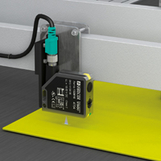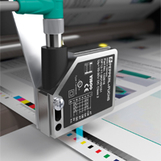
When a contrast sensor passes the taught-in point between the background and print mark, it quickly recognizes it and indicates the exact position of the mark. These sensors are used for precise object positioning in printing machines, packaging plants, and labeling machines in the food, beverage, and pharmaceutical industries. They are characterized by a low contrast resolution, a high degree of switching reliability when differences in contrast are minimal, short response times, and insensitivity to fluctuations in height and angle on the material web.

Unlike contrast sensors, which operate using a similar principle, color sensors operate on multicolored backgrounds with an exceptional degree of reliability. The sensor periodically scans the target material on the R, G, B color channels in order to detect the taught in color. Three different colors can be taught in and recognized in parallel.






 +27 87985 0797
+27 87985 0797